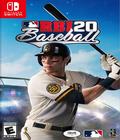In no particular order, there have been three major things that have occurred for the sport of baseball in the off-season. The first is the revelation and confirmation that the Houston Astros cheated their way to their only World Series win in 2017. The second is the COVID-19 pandemic, which prevented opening day from happening and at the time of this writing, has derailed the season potentially to cancellation. As a bit of good news, the third major thing that happened was the announcement that MLB: The Show would become a multi-platform title starting in 2021. Conventional wisdom would dictate that with the critically acclaimed series coming to the Nintendo Switch, the MLB's own game R.B.I. Baseball 20 could potentially be the final one in the series. If this is the series' swan song, it leaves the game world in a slighter better state than when it first arrived on the system roughly three years ago.
This year, the big feature is the overhauled pitching and batting systems. The good news is that players who liked things the way they were still have the option to use the classic control scheme. Even better, the game allows you to mix and match both classic styles with the more modern ones, so those who want classic batting and the newer pitching style, for example, can get just that.
The new pitching system aims to bring about a more sim-like approach to this aspect of the sport, as you have access to more options when it comes to the type of pitch you want to throw. You use the analog stick to select a pitch from the radial menu before using it again to aim where the pitch is going. The length of time the button is held determines the strength of the pitch, while cursor stability provides a clear indicator of whether the pitcher is fine or tired. It doesn't take much time to get used to the system, but it feels similar to baseball sims, which employ a similar pitching system. Kudos to them for also taking a page from the old Bases Loaded series and moving the camera to the pitcher's point of view when playing solo.
Batting, on the other hand, doesn't go for a sim style, as it aims to be more of an arcade alternative approach. Instead of timing a button press to hit the ball, you have to hold down the hit button to preload how much strength you want to put into the swing and let go of the button to perform the swing. The method works if you're going for full power swings all the time, but it feels needlessly complicated for those who want to vary their strength to play strategically. It also doesn't help that the lowering of the camera makes it tougher to hit the ball at any strength level. For most people, that means sticking with the classic control method and not bothering with the modern one.
The rest of the game remains relatively unchanged, so every good thing the game doing is countered by something that feels unpolished. Fielding is fine for pop-fly balls, but the game moves your chosen fielder for a brief second before having him stop so you can take control; it's a moment that can cause a few missed catches if you aren't prepared for it. Foul balls automatically cut away to the batter in the box, which can be good for those who want to speed up the game but bad because it doesn't do this all the time, giving you false hope that you can catch a foul ball for an out. The AI is good at picking the right play to execute most of the time, but it flubs things like trying to stop the lead base runner instead of going for the easy out. In short, take every bit of praise and criticism from the last game, and it'll likely apply here.
The game modes remain unchanged from previous iterations, which means that you shouldn't expect anything too deep. Exhibition mode has you choosing between all 30 of the current MLB teams, along with the All-Star teams for both the American and National leagues. You get one American League and one National League team composed of the sport's historical greats, but don't expect historically significant versions of each team. The Home Run derby is also here, where you go through three rounds of trying to score more home runs than your given opponent. Playoff mode has you playing to earn a Wild Card spot before trying to make it to and winning the World Series. Meanwhile, Franchise mode tasks you with running one team through 10 years. As expected, you'll do the usual owner stuff, like making trades and trying to recruit free agents to make up for retired players. The options cater to all types of players, and the logic won't allow for unrealistic trades unless you turn on that option.
A sports game doesn't necessarily need plenty of modes to be considered great, especially since casual players may only delve in exhibition games. The lack of an online mode hurts when you consider that R.B.I. Baseball 20 has it on other platforms, but Switch players have given up hope about the feature. What may hurt more is the fact that the title robs the player of any real satisfaction for any accomplishments. There's no big celebration when winning a match. Getting a Home Run Derby trophy or the World Series trophy also feels anti-climactic. That is the last thing you ever want to feel about a sport, but it's not a good sign that the game accomplishes this so easily.
The presentation, like the rest of the game, does the job but goes no further than that. Sound-wise, the effects are good enough, while the soundtrack is quite good. Some of the songs tend to repeat often, but for a game that isn't considered a triple A effort, it's impressive that it got the likes of Andy Grammer, Galantis and OneRepublic. The voice work suffers, as the game only has a general ballpark announcer. The lack of an umpire's voice can be forgiven due to the announcer, but it makes the game feel sterile even if the games go faster than expected.
Graphically, R.B.I Baseball 20 barely matches what's seen in games from the previous console generation. The character models look fine until you see their facial hair and eyes. The former looks pasted on, and the latter can look dead. Animations also look decent until you see things like hands not connecting to baseballs and bats making contact even though the swing doesn't appear in the vicinity of the ball. The odd transitions can produce strange animations, like batters suddenly jetting back to home plate after a foul ball hit. The home run celebrations suddenly drop frame rate down to the teens, even though some of the shots show more of the skybox, which usually benefits frame rates since there's less to render. When you get to the point where the player portraits look blurry, graphical quality can't be a strong suit. Oddly enough, the crowd is quite captivating. While the figures are blurrier than expected, their smooth animations make you realize that they're simply video captures of various people stitched together, and it'll remind you of classic arcade games — as well as the fact that these animations are smoother than the player animations.
If R.B.I. Baseball 20 were the only baseball title on the Switch, then it would be considered serviceable yet underwhelming. The new pitching and batting systems will divide players, but the fact that you can mix and match both styles makes for a good compromise. The AI remains questionable, and the scant number of modes and the bare-bones presentation don't help matters. As it stands, fans of arcade baseball outings who don't mind whether their players and teams are based on real-world ones will be better served with any of the Super Mega Baseball titles. If sim fans don't feel like settling with this game, they'll have to tough it out and wait until MLB The Show 21.
Score: 5.0/10
More articles about R.B.I. Baseball 20











 R.B.I. Baseball 20 builds on its foundation of matching arcade baseball action with an ever-increasing array of updates, features and enhancements.
R.B.I. Baseball 20 builds on its foundation of matching arcade baseball action with an ever-increasing array of updates, features and enhancements.








